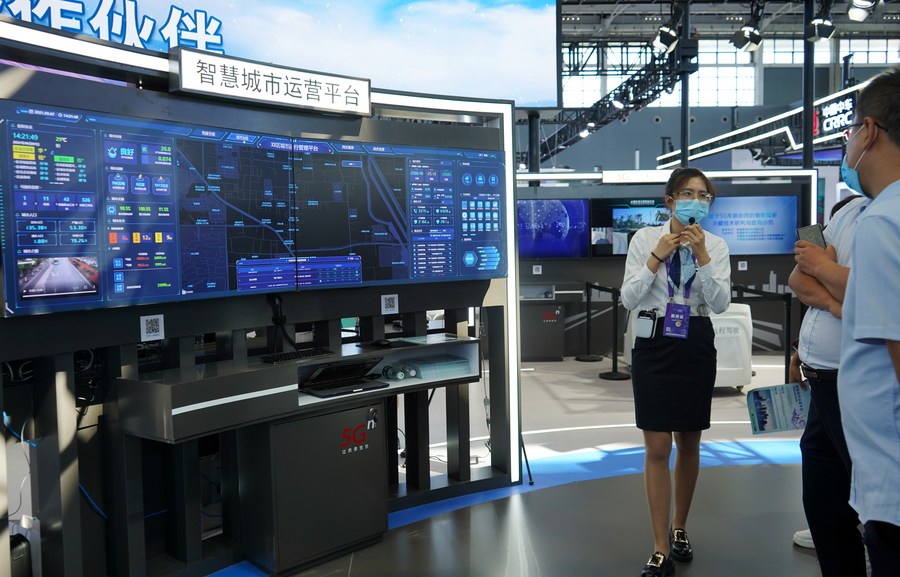China formulates plan for new infrastructure to spur domestic demand, economic transformation and growth sustainability

A staff member introduces a smart platform for city operation at the China International Digital Economy Expo 2021 in Shijiazhuang, north China's Hebei Province, Sept. 7, 2021. (Xinhua/Jin Haoyuan)
BEIJING, Sept. 22 (Xinhua) -- China has formulated a plan for new infrastructure to spur domestic demand, economic transformation and growth sustainability.
The State Council's executive meeting chaired by Premier Li Keqiang on Wednesday adopted the 14th Five-Year Plan for New Infrastructure Development, to spur domestic demand, economic transformation and growth sustainability.
In the 14th Five-Year Plan period (2021-2025), a well-calibrated layout will be made for the development of new infrastructure, underpinned by information networks and technological innovation. This is conducive to sustaining growth, readjusting the structure and benefiting the people.
"We should better harness the key role of effective investment," Li said, "Advancing new infrastructure development will help mobilize effective investment, sustain growth, readjust the structure and enhance people's wellbeing."
Information infrastructure development will be accelerated. National backbone networks and metropolitan area networks will be fortified with higher bandwidth in a coordinated way. Gigabit fiber optic networks will be remodeled to deliver faster connection. The commercial use of new-generation mobile communication networks of scale will be advanced. Space-based information infrastructure will be improved for satellite communications, navigation, remote sensing and other purposes. Ubiquitous and collaborative Internet of Things will be developed.
Integrated infrastructure will be steadily developed. A multi-tiered industrial internet platform will be fostered to promote collaborative innovation. In line with advancing the new urbanization, smart infrastructure will be built in transportation, logistics, energy, and urban utilities. Agriculture will be made more digitized. Infrastructure related to people's lives such as telemedicine and online education will be advanced.
"The planning and construction of new infrastructure should move forward along with technological advances and innovation. We may plan ahead wherever possible, yet also take a fact-based approach and take things forward step by step," Li said.
In-depth integration among universities, research institutes and high-tech enterprises will be facilitated, to strengthen capabilities of high-level, interdisciplinary and frontier research. The research and development of industrial generic technology will be supported. Open and specialized makerspaces will be developed, to spur entrepreneurial activity and innovation.
"Government investment, such as central budgetary investment and local government special-purpose bonds, should be better utilized, to mobilize investment from the private sector, and advance the development of new infrastructure in a well-calibrated and well-paced way," Li said.
Investment from diversified channels will be encouraged, and openness and cooperation advanced. The private sector and overseas investors will be supported in participating in the investment and operation of new infrastructure. China will take an active part in the formulation of relevant international rules and standards. Security supervision systems will be improved, to enhance the capacity for security safeguards.
Photos
 Bumper harvest presents a magnificent scene of terraced rice paddies in SW China's Luzhou city
Bumper harvest presents a magnificent scene of terraced rice paddies in SW China's Luzhou city In pics: life of Siberian tigers in NE China's breeding center
In pics: life of Siberian tigers in NE China's breeding center Explore wonderland created by an alpine lake cluster in SW China's Yunnan
Explore wonderland created by an alpine lake cluster in SW China's Yunnan In pics: Museums across China unveil creative and culturally-inspired mooncakes
In pics: Museums across China unveil creative and culturally-inspired mooncakes
Related Stories
Copyright © 2021 People's Daily Online. All Rights Reserved.






